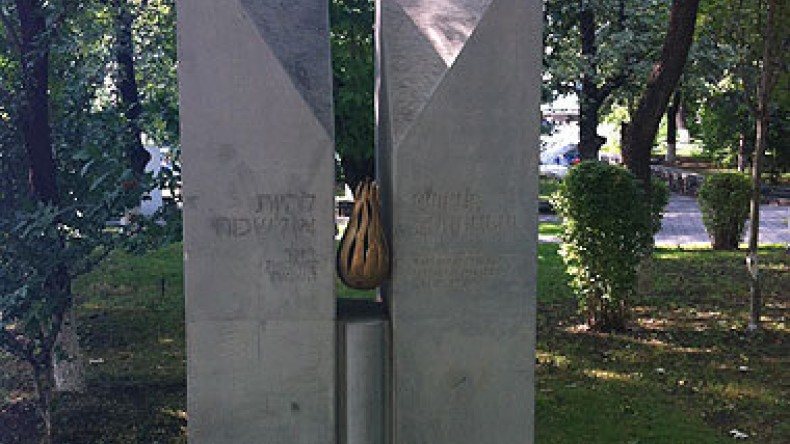
Never again. The memory as means to prevent genocides
About 70 years ago, on January 27, 1945, the Soviet Red Army soldiers liberated those few still alive inmates of Auschwitz–Birkenau Nazi concentration and extermination camp, located near Polish town of Oswiecim, then annexed by Nazi Germany.
Auschwitz was the biggest concentration camp operated by the Third Reich, and also was the longest functioning death camp. By various estimates, in the years of the Nazi regime here around 1,6 million people were killed, among them 1,1 million Jews. Perhaps this is the reason why Auschwitz has become the most crucial symbol of the Holocaust, and the day of liberation of this death camp – January 27 – has been designated as The International Day of Commemoration in Memory of the Victims of the Holocaust by a special resolution of UN General Assembly.
Though Armenia has never become a battlefield during the Second World War and there is no vast Jewish community in our country, as the President of Armenia Serzh Sargsyan noted in his address on the International Day of Commemoration in Memory of the Victims of the Holocaust, “Armenian people more than anyone empathizes with the pain of the Jewish people”.
Such a claim is well reasoned by few factors. First of all, in the territories occupied by Nazi Germany (Austria, Benelux, France, Balkans, Belarus, Ukraine, Moldova, Russia, etc) hundreds of thousands of Armenians were living at the time, most of them after having miraculously survived the genocide perpetrated by Turkey some 30 years before, and they did realize clearly what was being committed against the Jewish people in the occupied territories. Besides that, more than half a million Armenians were fighting in Soviet Red Army against the Hitler’s Germany, as well as in the armies of other allied powers of anti-Hitler coalition and in the rows of national liberation and guerrilla movements in other occupied states, whereas many of them partook in the liberation of Auschwitz and other, more than sixty concentration camps.
Obviously, many Armenians had witnessed the Holocaust, organized and perpetrated by the Nazi Germany, and passed over some details of that blood-freezing reality to their descendants and all the mankind. And many more, with exemplified courage and putting under risk their own lives, have saved thousands of Jews from the Nazi killing machine.
There have been many of such courageous Armenians, and the Jewish people not only know them, but also have expressed acknowledgment and appreciation to them.
According to the Holocaust Martyrs’ and Heroes’ Remembrance Law, adopted by Israeli Knesset in 1951, a special title of “Righteous Among the Nations” was established to honor those non-Jews, “who had risked their lives in order to save Jews”. Those decorated with such title are also sometimes called “apostles of humanity”.
As noted in the Yad Vashem Holocaust Museum official website, to this day the title of “Righteous Among the Nations” has been recognized for 25271 people.
The majority of them are citizens of Poland (6454 people), the Netherlands (5351 people), France (3760), Ukraine (2472), Belgium (1665). The present geography is perhaps explained by the fact, that these countries were under Nazi Germany occupation and it was in the territory of these states that Third Reich carried out its genocidal campaign. Of course, the numbers of people that had risked their lives to save Jews was not small in other states under Nazi occupation either.
Whereas those countries, which had not been under Nazi occupation, had quite modest contribution to the mission of saving Jewish people. As a matter of fact, Armenians distinguish themselves in this regard: according to data presented by Yad Vashem, there are 24 “Righteous” Armenians recognized across the world. And this is despite the fact that Armenia was quite far from the regions where one of the most horrific events of human history – the Holocaust – was taking place. To give a perspective, we may only point out that in Switzerland, which had been a neutral state during the WW2 and had sheltered and taken care of tens of thousands of Jews, only 45 people had been recognized “Righteous”. Other European nations, which were not under Nazi occupation and neither were allies of Third Reich, have far more modest numbers: 21 in United Kingdom, 10 in Sweden and one in Ireland.
For the sake of comparison on the regional level, only one person was recognized “Righteous” from Georgia, and none in other non-occupied post-Soviet states like Azerbaijan and those in Central Asia.
This is not accidental. Armenians could not stay idle towards the tragedy of Jewish people in the years of Holocaust still having in mind their own anguish during the First World War, and remembering the numerous extended hands of help by the Jewish people during the years of Armenian Genocide.
Given that in 2015 we mark the Centennial of Armenian Genocide, as well as the 70th anniversary of the liberation of Auschwitz, Panorama.am will be publishing a series of articles devoted to those representatives of Jewish people that stood by Armenians in the years of Armenian Genocide and to those Armenians that devoted themselves to the saving of Jews in the years of Holocaust, as well as to the daily lives of communities of Armenians and Jews in their respective homelands.
Armen Minasyan, political scientist
(In the photo: The Yerevan Holocaust Memorial)
Newsfeed
Videos






























